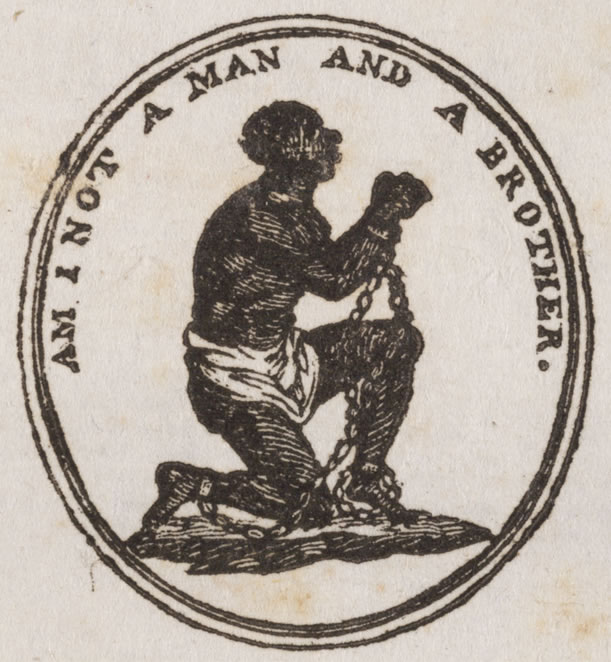The Anti-Slavery movement
The Anti-Slavery movement
One of the key people at the time was a man called Josiah Wedgewood. He was anti-slavery and a very rich pottery maker. He spent 10,000 pounds of his own money to expanding the canals. This was important for him as it meant that he could transport his pottery in a safer way than using horse and cart. He was also a key anti-slavery campaigner . He created the symbol and the phrase 'Am i not a man and a brother' which was a famous slogan which was sent to Benjamin Franklin in 1788. Many middle class people had this slogan on the pottery they would buy off him Josiah Wedgewood lived until 1795 so never saw the end of the slave trade or the end of slavery altogether.
Abolition of Slavery Act 1807
This act ended the trading of slaves but did not help those already enslaved in the British colonies.
This was passed as the West Indies sugar production was not important anymore to the economy as industrialisation was producing greater source of wealth. There was attitudes were changing and the middle and upper classes were developing a stronger moral sense with the idea of evangelicanism.
The Anti-Slavery movement 1815-1833
This issue came up again at the end of the Napoleonic Wars in 1815 with peace negotiations among the European powers. What could of happened that if Britain gave back the Africa and Caribbean control they took during the war the slave trade would start to build up again. So what people like William Wilberforce did (who was an evangelical and part of the Clapham Sect who were anti-slavery) was bombard Lord Liverpool with petitions. What happened in the end was that British naval squadrons would patrol the West African coastline to stop any slavery happening but was not always effective. In 1823 there was creation of Anti-Slavery society with the founders was Wilberforce and Thomas Buxton which formed throughout the British Colonies. Canning was pro anti-slavery failed to pass the law to allow a child born into slavery to be free. This is because he came under pressure from the plantation owners who argued that a healthy slave was worth 50 pounds. Also they face competition from rival slave owners in the USA. It was not until the Whigs and Earl Gray was in power With Wilberforce and Buxton's help they passed the Abolition of Slavery Act 1833 in return the British government paid out 20 million pounds to plantation owners.

One of the key people at the time was a man called Josiah Wedgewood. He was anti-slavery and a very rich pottery maker. He spent 10,000 pounds of his own money to expanding the canals. This was important for him as it meant that he could transport his pottery in a safer way than using horse and cart. He was also a key anti-slavery campaigner . He created the symbol and the phrase 'Am i not a man and a brother' which was a famous slogan which was sent to Benjamin Franklin in 1788. Many middle class people had this slogan on the pottery they would buy off him Josiah Wedgewood lived until 1795 so never saw the end of the slave trade or the end of slavery altogether.
Abolition of Slavery Act 1807
This act ended the trading of slaves but did not help those already enslaved in the British colonies.
This was passed as the West Indies sugar production was not important anymore to the economy as industrialisation was producing greater source of wealth. There was attitudes were changing and the middle and upper classes were developing a stronger moral sense with the idea of evangelicanism.
The Anti-Slavery movement 1815-1833
This issue came up again at the end of the Napoleonic Wars in 1815 with peace negotiations among the European powers. What could of happened that if Britain gave back the Africa and Caribbean control they took during the war the slave trade would start to build up again. So what people like William Wilberforce did (who was an evangelical and part of the Clapham Sect who were anti-slavery) was bombard Lord Liverpool with petitions. What happened in the end was that British naval squadrons would patrol the West African coastline to stop any slavery happening but was not always effective. In 1823 there was creation of Anti-Slavery society with the founders was Wilberforce and Thomas Buxton which formed throughout the British Colonies. Canning was pro anti-slavery failed to pass the law to allow a child born into slavery to be free. This is because he came under pressure from the plantation owners who argued that a healthy slave was worth 50 pounds. Also they face competition from rival slave owners in the USA. It was not until the Whigs and Earl Gray was in power With Wilberforce and Buxton's help they passed the Abolition of Slavery Act 1833 in return the British government paid out 20 million pounds to plantation owners.

Comments
Post a Comment